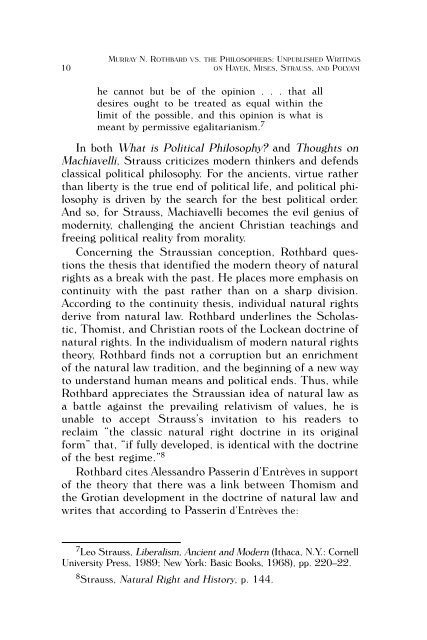Murray N. Rothbard vs. the Philosophers - Ludwig von Mises Institute
Murray N. Rothbard vs. the Philosophers - Ludwig von Mises Institute
Murray N. Rothbard vs. the Philosophers - Ludwig von Mises Institute
You also want an ePaper? Increase the reach of your titles
YUMPU automatically turns print PDFs into web optimized ePapers that Google loves.
MURRAY N. ROTHBARD VS. THE PHILOSOPHERS: UNPUBLISHED WRITINGS<br />
10 ON HAYEK, MISES, STRAUSS, AND POLYANI<br />
he cannot but be of <strong>the</strong> opinion . . . that all<br />
desires ought to be treated as equal within <strong>the</strong><br />
limit of <strong>the</strong> possible, and this opinion is what is<br />
meant by permissive egalitarianism. 7<br />
In both What is Political Philosophy? and Thoughts on<br />
Machiavelli, Strauss criticizes modern thinkers and defends<br />
classical political philosophy. For <strong>the</strong> ancients, virtue ra<strong>the</strong>r<br />
than liberty is <strong>the</strong> true end of political life, and political philosophy<br />
is driven by <strong>the</strong> search for <strong>the</strong> best political order.<br />
And so, for Strauss, Machiavelli becomes <strong>the</strong> evil genius of<br />
modernity, challenging <strong>the</strong> ancient Christian teachings and<br />
freeing political reality from morality.<br />
Concerning <strong>the</strong> Straussian conception, <strong>Rothbard</strong> questions<br />
<strong>the</strong> <strong>the</strong>sis that identified <strong>the</strong> modern <strong>the</strong>ory of natural<br />
rights as a break with <strong>the</strong> past. He places more emphasis on<br />
continuity with <strong>the</strong> past ra<strong>the</strong>r than on a sharp division.<br />
According to <strong>the</strong> continuity <strong>the</strong>sis, individual natural rights<br />
derive from natural law. <strong>Rothbard</strong> underlines <strong>the</strong> Scholastic,<br />
Thomist, and Christian roots of <strong>the</strong> Lockean doctrine of<br />
natural rights. In <strong>the</strong> individualism of modern natural rights<br />
<strong>the</strong>ory, <strong>Rothbard</strong> finds not a corruption but an enrichment<br />
of <strong>the</strong> natural law tradition, and <strong>the</strong> beginning of a new way<br />
to understand human means and political ends. Thus, while<br />
<strong>Rothbard</strong> appreciates <strong>the</strong> Straussian idea of natural law as<br />
a battle against <strong>the</strong> prevailing relativism of values, he is<br />
unable to accept Strauss’s invitation to his readers to<br />
reclaim “<strong>the</strong> classic natural right doctrine in its original<br />
form” that, “if fully developed, is identical with <strong>the</strong> doctrine<br />
of <strong>the</strong> best regime.” 8<br />
<strong>Rothbard</strong> cites Alessandro Passerin d’Entrèves in support<br />
of <strong>the</strong> <strong>the</strong>ory that <strong>the</strong>re was a link between Thomism and<br />
<strong>the</strong> Grotian development in <strong>the</strong> doctrine of natural law and<br />
writes that according to Passerin d’Entrèves <strong>the</strong>:<br />
7Leo Strauss, Liberalism, Ancient and Modern (Ithaca, N.Y.: Cornell<br />
University Press, 1989; New York: Basic Books, 1968), pp. 220–22.<br />
8Strauss, Natural Right and History, p. 144.


